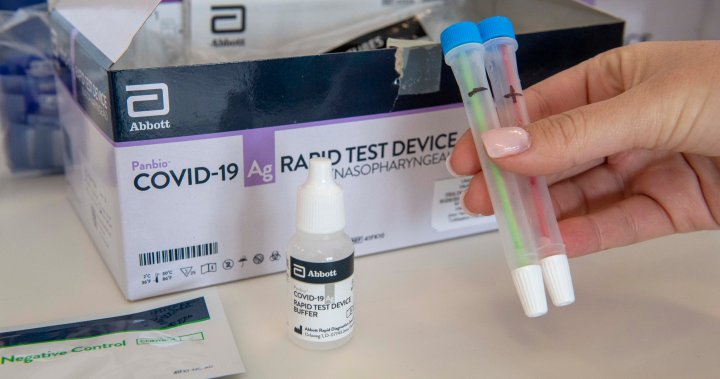Federal public servants who have a valid medical or religious reason not to get the COVID-19 vaccine will be able to use rapid antigen tests as an alternative. However, those tests currently “aren’t accepted” for passengers on domestic planes or trains who have a medical exemption from getting their vaccine.
An order-in-council issued on Oct. 6 authorized the federal health minister to transfer COVID-19 test kits “to any province or to any body or person in Canada in support of the Government of Canada’s implementation of a COVID-19 vaccination initiative.”
A spokesperson for Health Canada confirmed the authorization comes as the federal government is preparing to deliver rapid antigen tests to organizations or departments that fall under the mandate so they can accommodate employees who are unable to get a COVID-19 vaccine.
The rapid testing alternative does not apply to employees who are simply unwilling to get the vaccine.
Read more:
More employers in Canada are mandating workplace vaccination. Here’s why
Prime Minister Justin Trudeau announced on Aug. 13 that COVID-19 vaccination will be required this fall for all employees of the federal public service, as well as for anyone wanting to board a plane or a train.
The details were unveiled earlier this month, when officials confirmed those requirements will snap into place on Oct. 30 for those over the age of 12 and seeking to board a plane or a train in Canada.
There will be a temporary grace period in the travel rules until Nov. 30, “when travellers who don’t yet qualify as fully vaccinated will be able to travel if they can show a valid COVID-19 molecular test taken within 72 hours of travel.”
Read more:
Notice offering options for federal workers who refuse vaccines was ‘erroneous,’ says Trudeau
According to those travel rules, there will be “very limited exceptions to address specific situations such as emergency travel, and those medically unable to be vaccinated.”
Those regulations currently state that “rapid antigen tests aren’t accepted.”
For employees of the federal public service, those who either refuse to disclose whether they are vaccinated or refuse to get vaccinated can be placed on leave without pay as of Nov. 15.
There will only be exemptions from the federal public service vaccination requirement for “employees that cannot be fully vaccinated due to a certified medical contraindication, religion, or any other prohibited ground of discrimination as defined in the Canadian Human Rights Act.”
Mandatory testing measures can be put in place as accommodations are deemed necessary on a case-by-case basis for those unable to be fully vaccinated, the policy for federal workers states.
So will a vaccine-exempt public servant regulating Via Rail or a domestic airline end up using a different type of test than a vaccine-exempt passenger trying to board a train or a plane operated by the carriers?
Likely — but there appears to be a reason.
Dr. Susy Hota, the medical director for the University Health Network’s infection prevention and control unit in Toronto, told Global News that deciding which tests to require in which situations is all about balancing risks.
“These tests do function differently,” Hota explained.
Read more:
Everything you need to know about COVID-19 rapid antigen tests
The PCR test is the one many Canadians will be familiar with as the “brain tickler” — it goes deep into the nasal cavity, and can range in sensation from uncomfortable to painful depending on the person.
As Hota explained, this is the default test used when “the stakes are high and you want to diagnose an infection,” because the test is highly accurate.
The drawback is that it can take anywhere from eight hours to 48 hours to get results, since the test needs to be processed in a laboratory.
Enter, rapid antigen tests.

These tests are less invasive, since they do not go as deep up the nose as a PCR test. They are also processed much more quickly — typically around 15 minutes. But they are also less accurate, particularly when it comes to producing false negatives.
Rapid antigen tests are more useful when used for repeated, regular screening, Hota said, noting that while there are “shortcomings” to using the rapid tests, the wait time to get results from PCR tests means they are not currently practical for use as a screening tool in workplaces.
With travellers, though, there is typically only one opportunity for testing.
“So you want something that’s a little bit better at detecting,” Hota said, adding that until a quicker, more accurate option is available for testing in environments like workplaces, the goal will be making the best choices possible out of a difficult set of options.
“You’re balancing the risk of the situations,” she said.

© 2021 Global News, a division of Corus Entertainment Inc.














































